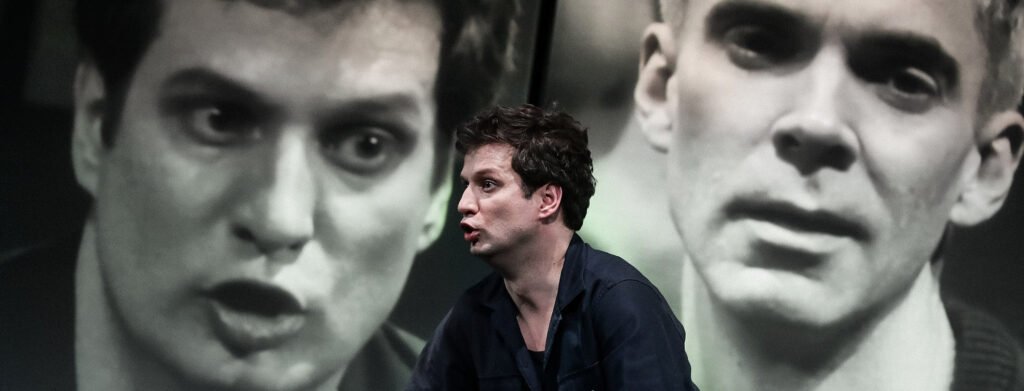
A staged concert: Nico and the Navigators embark on a journey through the world of Franz Schubert’s songs to explore them in the here and now.
SILENT SONGS into the wild
A stranger I arrived here…
What means this stirring? Does the east wind bring me good news?
I am used to going astray, Every path leads to one goal…
Franz Schubert’s Lieder are about wandering and departure, about everlasting disaffection and loneliness. What would it mean in a time of mass migration to approach these texts and lieder with all our senses?
How much courage is needed to leave oneself exposed to the deeply embedded and strong emotions, the upheaval of feelings, of pain and loss, longing and love, revenge and hope? Have these feelings changed in the 21st century? How does music escape the body and how do emotions find manifestation in an auditory experience?
For String Quartet, 4 Singers, 3 Performers, Piano and E-Guitar
In ‘SILENT SONGS into the wild’ singers, musicians and dancers embark on a journey through the world of classical song discovering them anew in the here and now. They are not limited to their voice but utilize their whole personalities and their complete range and repertoire of emotions and movement. Within the tension field of intimacy and outburst, past and present, they develop new vocal and corporal forms of interpretation, finding their own avenues to these once popular songs.
Going forth with great respect for the original pieces the questions are asked: What happens when a song succumbs to the free will of the singer? Might the aria end in laughter? In apathy? In sobbing? In Arabic lament songs? In Jazz? How do contemporary audiences experience Schubert’s songs? Enticing, touching, artificial or estranged? Maybe highly topical? How can our present desires and life attitudes find reflection in these works? In a dialog between performers, a string quartet, a pianist and an e-guitar player these questions will manifest in a range of different sonic and visual variations.
A first research project took place in October of 2015 together with vocal students from the Theaterakademie August Everding.
Foundation
Songs from the cycles “Schwanengesang”, “Winterreise” and “Die Schöne Müllerin” as well as other Schubert songs are interwoven over the course of the evening revealing a surprising and unknown cycle. Scenic moods grow from between the Lieder – topical societal references through musical association. Set into motion, the Navigators react like a seismograph to Schubert’s Lieder.
A production by Nico and the Navigators and BOZAR Brussels. Coproduced by the Niedersächsischen Musiktage as well as the Konzerthaus Berlin. In cooperation with the Elbphilharmonie. Funded by the German Federal Cultural Foundation, the Rusch Foundation and by the Land of Berlin.
“Schubert’s music as a hymn of empathy and good humour, of friendship and homeland. One walks out confidently, one’s head full of good music.”
Schubert wrote 600 songs. Time and again, they have been artistically reworked by others. Now by Nico and The Navigators.
The singer is silent. The pianist waits. The audience holds its breath. This is that famous opening moment when two musical lone warriors become a monad, which in itself is an impossibility. Seconds stretch into minutes. Anyone who has ever experienced a song recital knows this. At some point, the man must finally open his mouth!
On the stage of the Verdo concert hall in Hitzacker, at the premiere of the new Schubert production by Nico and The Navigators, the faces of the actors can be seen in parallel, also in close-up, on the video screen. The Russian baritone Nikolay Borchev stares holes in the air, his song accompanist Jan Philip Schulze looks worried.
Then encouraging, demanding, pleading, asking. Mischievous, affectionate, ironic, desperate. How many different ways are there of shouting "Now!" with mimicry alone? Or: "Now, let's go"?
The sublime and the banal are close together
Finally, the first notes of the prelude to the "Ständchen" from Franz Schubert's "Schwanengesang" drip heavily from the grand piano. Pathos and silliness, the sublime and the banal are so close together in this music that the "Komm, beglücke mich!" at the end of the chorus, when the voice soars, may be understood either way, even personally.
Schubert wrote more than 600 songs. No two are alike, not every text set to music is great literature. But there is hardly a song that has not succeeded in its own way. Some became folk songs, many belong to the treasure trove of quotations of generations.
It is not a new idea that one has to create artistic added value out of this worldwide popularity as a "free rider" (Matthias Goerne), so to speak, and that one has to paint over the Schubert song in a worldly way, recompose it and process it into new songs or novels, dance or theatre evenings. There are scenic Schubert song cycles by Christoph Marthaler, William Kentridge and many others.
The ensemble is joined by the fabulous Kuss Quartett
The ensemble Nico and The Navigators around director Nicola Hümpel already made their contribution to this fashion in 2017 with "Silent Songs into the wild" in Brussels, in co-production with the Berlin Konzerthaus. Now, at the opening of the Summer Music Days in Hitzacker, a radicalised second version was premiered, with a largely new cast.
For the first time, Jan Philip Schulze is taking part, contributing some virtuoso solo pieces, including a powerful arrangement of "Die Stadt". In addition, there is the fabulous Kuss Quartet. It contributes chamber music islands of non-verbal poetry, for example, dead-worm ticking, in "Death and the Girl".
The performers come from seven countries
Above all, they mingle improvisationally with the rest of the travelling folk of singers, dancers, acrobats. Some songs are accompanied only by harmonies chirped in flageolet. Others turn into songs without words, sung by piano, guitar and double bass (Tobias Weber). Still others are spoken or fray into Arabic lament melismas by the Algerian-born contralto Sarah Laulan.
The performers come from seven countries. This is the basic theme of the evening - Schubert's music as a hymn of empathy and good humour, of friendship and home. One walks out confidently, one's head full of good music. The fantastic double projections, which are processed by Oliver Proske's video technology, dominate the scene.
“It really is the case that Schubert’s classical Lieder have rarely seemed so fresh or been so cheerfully and ironically performed as they have by this ensemble, which fearlessly tears down frontiers.”
The ensemble Nico and the Navigators delights with song and dance in the Small Hall Hamburg. The Schubert song "Der Leiermann" has rarely been heard so sweetly - delicately interpreted by tenor Ted Schmitz. From Mahler as a tableau vivant to Shakespeare's sonnets, the Berlin-based ensemble Nico and the Navigators has brought various fruitful fusions of text classics, opera, song and classical music to the stage. Now, on the occasion of the thematic focus "Winter Journeys" in the Elbphilharmonie, it invited to "Silent Songs Into The Wild" in the Small Hall. And indeed, one has seldom experienced Schubert's classical songs as fresh and then again as cheerful and ironic as with this fearlessly boundary-breaking ensemble. Schubert's song art encompasses stories of wandering, love, parting. They evoke associations with home, strangeness and loneliness. For a contemporary interpretation today, the ensemble of four singers and three dancers as well as a pianist and a guitarist, augmented by the Apollon Musagète Quartet, finds unassuming but effective images. The excerpts from Schubert's well-known cycles, who wrote close to 600 songs, become little scenes, ravishing miniatures observed by two unobtrusive camera eyes left and right of the stage. The mulled wine stand warms you during the intermission The actors, all in everyday costumes, know exactly where to place themselves on the floor markings to land in close-up on the large, separable screen. The images expand the - mostly melancholic - emotional worlds as well as the movements of the dancers, most notably Yui Kawaguchi, who pulls off several artful solos and proves her versatility. Anna-Luise Recke, on the other hand, literally plays with the singers' bodies, merging with them or sometimes thundering her fist against a ribcage. Soprano Julia von Landsberg shines with humor. Sarah Laulan lends her contra alto to stories of escape. Most of the songs are rather melancholic, the ensemble concedes, only to dance across the stage in a particularly joyful manner during "Farewell". At the end, after three hours, when the D minor string quartet "Death and the Maiden" is heard, the enthusiasm of the audience is released. Some warmed themselves during the intermission, freezing due to renovations, at the mulled wine stand on the staircase. Its drink made the timeless songs sound even a little more comforting.
“The images come across as highly topical, yet never set up… There were many cries of “bravo” as well as long-lasting applause in the almost sold-out concert hall after a stimulating and exhilarating evening. An evening so multi-faceted that it really isn’t enough to experience it only once.”
Almost 20 years ago, the artist couple Nicola Hümpel and Oliver Proske founded a theater collective at the Bauhaus in Dessau with the strange name Nico and the Navigators - Nico stands for Nicola, the Navigators are their comrades-in-arms and instigators. A cooperation with the Sophiensälen in Berlin soon followed, where the group developed their first plays as artists in residence. Projects at the Radialsystem and at the opening of the Tischlerei at the Deutsche Oper followed. In the meantime the Navigators have established themselves as a permanent fixture in Berlin's independent scene. Whereby established is to be understood purely artistically. Although the troupe can now be seen in international co-productions throughout Europe, the artistic work is accompanied by the tough struggle for funding. Fortunately, creativity has not suffered in the process, as evidenced by the Berlin premiere of Silent songs into the world, which can now be seen at the Konzerthaus after its Brussels premiere in February. Silent songs into the world is subtitled Staged Concert with music by Franz Schubert, but it is much more than a staged concert. Nicola Hümpel draws on songs by the composer that are about wandering and travel and everything that has to do with it, be it feelings of longing, farewell, strangeness or happiness. Together with stage designer Oliver Proske, who is also responsible for the sophisticated video direction, she develops a collage of song and dance rich in associations, which subtly captures the moods of music and text. It is also full of surprises musically. Schubert is heard not only in the original, but alienated and in delicate new arrangements by guitarist Tobias Weber. Parallel to the actions, in which the instrumentalists - the Apollon Musagète Quartet, Weber himself and the pianist Matan Porat - are also involved, the faces of the performers are projected enlarged onto two movable screens. This creates a special closeness to the audience. Each musical number bears a modern headline. Gretchen at the spinning wheel for example, is called U-Bahn-Gretchen. Here Sarah Laulan crouches as a refugee woman in the middle of a group of people and sings "Meine Ruh ist hin". Or Meeres Stille with the supertitle Lampedusa: while Julla von Landsberg performs the song very delicately, the ensemble simulates waves through body movements. These images seem very topical, but never contrived. There are also humorous scenes, such as when Yui Kawaguchi exuberantly dances at the pianist during the piano impromptu. The piece leads into a rousing finale. With exuberant drive, all participants intonate Das Wandern ist des Müllers Lust . Each in his own language, because multinationality is also part of the concept. The singers, dancers and instrumentalists come from seven countries, and each of them brings his or her own story to the table. Together, however, they all form an absolutely homogeneous ensemble. And yet one soloist stands out: Baritone Nikolay Borchev sings with such sensitivity and sophistication that he recommends himself as a hopeful lieder singer. Many bravos and long-lasting applause in the almost sold-out Konzerthaus after a stimulating and gratifying evening. The evening was so multifaceted that a single experience is not enough. There will be an opportunity to deepen the impressions in March of next year at the Radialsystem.
“Nico and the Navigators succeed in staging the experience of being foreign and looking for one’s home in this multi-layered performance of Schubert’s songs so impressively that no pathos arises… creating a sound universe that comes across as modern, strong-willed and yet sensitive… At the end we hear the finale of Schubert’s string quartet “Death and the Maiden” – ringing out so clearly, energetically and convincingly that for a long time the audience has no desire to go home…”
"Silent songs into the wild" sees the Nico and the Navigators ensemble combine Schubert's songs with a multi-layered performance about flight and displacement in the concert hall. The topic of "flight and displacement" is not an easy one for art: approaches can quickly come across as overeager, trite or accusatory. So it is all the more astonishing that Nico and the Navigators, performing in the concert hall under the direction of Nicola Hümpel, succeed in staging the experience of being foreign and looking for one's home in this multi-layered performance of Schubert's songs so impressively that no pathos arises. "SILENT SONGS into the wild" starts off gently: the Apollon Musagète Quartet plays Schubert's "Der Wanderer", but defamiliarises the classical score by incorporating the guitar and double bass, thereby penetrating to the roots of this melancholy piece and creating a sound universe that comes across as modern, strong-willed and yet sensitive. The lines from "The Guide-Post" could read as a motto for the entire evening: "At every crossing there is a post / It points towards the town / I will travel far beyond them / I'll seek rest, but find none." The technological love chaos of the modern age Musicians, singers and dancers from seven nations are guided by the weightiness of the music and the turmoil of the lyrics. Each song has its own contemporary motto: "The Dead and the Living", "Lampedusa", or "Distant Lands". It isn't just dancers Yui Kawaguchi, Anna-Luise Recke and Michael Shapira who explore their bodies in powerful choreographies. The singers also have to prove themselves physically on stage; they are ensnared and encircled, danced around and fought over. Take tenor Ted Schmitz, who with his broad American accent knows how to break apart Schubert's songs and channel them into new directions. These are personal approaches that are not limited by reverence. While the first half may come across as a little wistful, the second part allows the artists to reflect the themes ironically. For instance, in "Tindertribe", when the technological love chaos of the western modern age is coupled with Schubert's "Good Night" and thereby becomes charged with transhistorical validity: "So love delights in changes, / God has made it so, / Ever-changing from old to new, / Good night, my love, good night!" At the end we hear the finale of Schubert's string quartet “Death and the Maiden” – ringing out so clearly, energetically and convincingly that for a long time the audience has no desire to go home.
…To be foreign and to arrive, to be desperate and to be safe – such is the subject matter of this finely choreographed evening, staged with great focus by Nico, endowed with brilliant stage and video effects by Oliver Proske, and held in the state-owned concert hall… This is what freedom feels like.
If the director Nicola Hümpel had chosen the discipline of art rock at the Bauhaus Dessau almost 20 years ago - the project would very likely also have been a success, given the stylistic confidence and admirable consistency inherent in this woman. But Nico, as she unceremoniously calls herself, together with her congenial partner Oliver Proske and a handful of other enthusiasts, decided at that time on an unheard-of, creative musical theater. "Nico and the Navigators" have long been international stars Nico and the Navigators have long since become international stars and are at home on the world's great stages. Whoever in Dessau, when the playfulness of the troupe outweighed the musicality, but the urge towards composition and wholeness was already clearly recognizable, should have smiled benevolently mildly - now he will simply be overwhelmed. On Monday evening, Nico and comrades presented their latest production in Berlin's Konzerthaus am Gendarmenmarkt, at the finest address in the capital: "Silent Songs into the wild": a "staged concert" with music by Franz Schubert. On the day after the sobering election, what commentary on the insecure image that Germany is currently presenting of itself could have been more fitting than this one! Singers, dancers and six musicians - all of exquisite quality and coming from different countries - perform a total work of art dedicated to the great Schubert and the question: Who is this I, where does it have its home? "Nico and the Navigators": This is what freedom feels like To be a stranger and to arrive, to be desperate and to be safe - this is what this finely choreographed evening in the stately Konzerthaus, staged to the point by Nico and brilliantly set up in terms of stage and video by Oliver Proske, is about. The place is forgotten, no politician's name haunts one's mind. One is only eye and ear and in the heart one with the actors. During the song of the linden tree, for example, accompanied by Tobias Weber with the touch of a blues guitar, home is freed of all the ballast that might have weighed you down. This is what freedom feels like.
A recital of associations – limber and yet heavy as lead, with boisterous moments and yet deeply sad, much like reality and like Schubert himself.
Nico and the Navigators, this is one of the German dance theater troupes, known especially for the desire of the boss, choreographer Nicola Hümpel, to explore, illuminate, illustrate the world of music through dance. Tonight, Nico and the Navigators invite you to a Berlin premiere. With their performance SILENT SONGS into the wild and they invite in Berlin to the Konzerthaus. Frauke Thiele could already explore there what to expect. F. Thiele: There is a strong melancholy in the concert hall, which of course has to do with Schubert's music itself. With the references to the theme of flight that the evening SILENT SONGS into the wild found in Schubert's songs. But the strong melancholy also arises, of course, from the topicality itself. N. Hümpel: Today is no longer yesterday. And quite extremely so. Germany has changed today, and we will certainly think of this evening from this point of view. We can't help it. If you think about it: We have united 7 nations here, which meet on this stage in an affectionate way and that makes you think, when it comes to these topics of foreign infiltration and so on. The evening means a lot to us as a team. F. Thiele: The 4 singers and 3 dancers wander around the stage a bit perplexed. In normal everyday clothes, in different shades of blue and gray. The scenery has nothing of a brilliant song recital of the classical kind. Even when baritone Nikolay Borchev steps up to the piano, a small dark blue fur boa casually around his neck, it has at best an ironic note - but without losing any of its melancholy. The idea of linking Schubert's songs with the aspect of loss of homeland came to Nicola Hümpel two years ago when she was working on Liedgut with students in Munich and the first streams of refugees had just arrived there at the train station. She asked singers from her pool of Nico and the Navigators to approach Schubert's songs from this aspect in a completely new way. N. Hümpel: That inevitably goes hand in hand when you hear these texts today by Heine and Müller. And in addition, of course, there are all these themes such as farewell, the search for home, eternal strangeness, loneliness, the longing for security. All these concepts are permanently present in the lyrics and in his music. F. Thiele: The singers chose songs themselves, sang them first, and amazing, very different subtexts soon crystallized. As in the case of the singer Sarah Laulan, whose parents fled Algeria as children and who had grown up with these stories of flight. When she sang Wanderer, first a subtle Arabic sound note emerged, then a lament, which Nicola Hümpel allowed to emerge. It is these personal moments that make the singers not only singers, the dancers not only dancers, the musicians not only musicians, but people with personal stories, different worlds of experience and associations on the subject of foreigners, home or farewell - also reflected in poems, quotations and very personal stories. The singers seem to sing directly to you or even speak to you, you see them enlarged and crystal clear on the screen. They look directly into one of the static cameras left and right of the stage and their faces and postures are mixed live in concert onto the two large screen surfaces. Often the dancers' movements are set directly against them, enhancing the expression. N. Hümpel: We feel very concretely addressed ourselves and basically what happens now on stage is what I always experience so wonderfully in the rehearsal room, and what often then gets lost in the big halls. Namely this incredible intimacy, the cameras are very, very intimate. F. Thiele: One could call it informal, how Nico and the Navigators approach the well-known Schubert songs, also again and again with humorous notes - when the dancer winds herself around the singer and thereby underlines the content of the devotedly sung love song with a languorous look and lets it become quite vivid. A song evening of associations - loose and yet leadenly heavy, with exuberant moments and yet deeply sad, like reality and like Schubert. Nicola Hümpel is convinced that bringing him into the here and now is a necessity - if we want his music to be preserved: N. Hümpel: "Schubert is there for everyone, Schubert was one of us, Schubert was not elitist and I would like to see such a cultural heritage preserved by simply performing it in a more contemporary way and I am firmly convinced that Schubert would be happy about that.






Tickets for this date are not available yet. Leave your mail adress to get notified when tickets are available.